外研版英语八年级下册 Module 10 On the radio Unit 2 课件(共32张PPT)
文档属性
| 名称 | 外研版英语八年级下册 Module 10 On the radio Unit 2 课件(共32张PPT) | 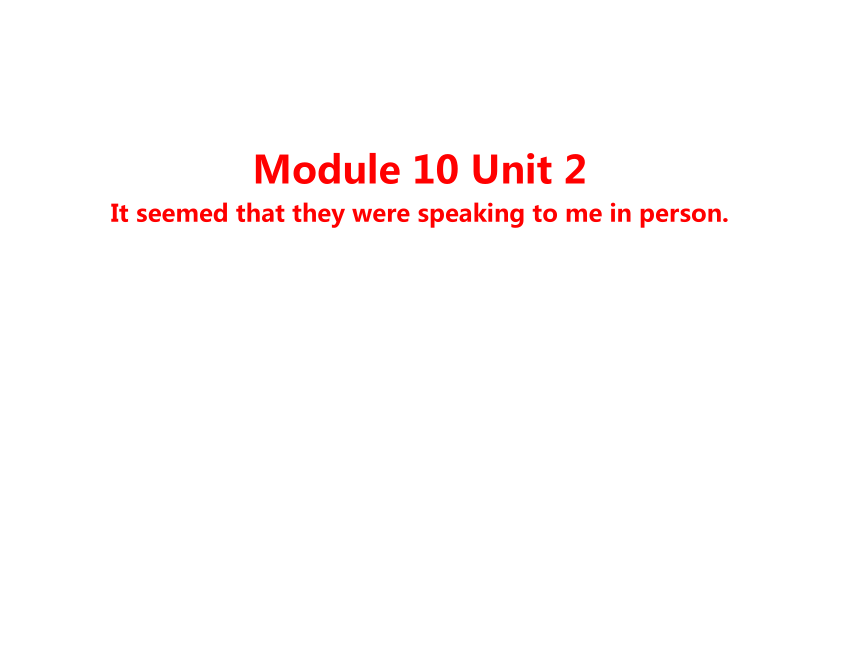 | |
| 格式 | zip | ||
| 文件大小 | 1.4MB | ||
| 资源类型 | 教案 | ||
| 版本资源 | 外研版 | ||
| 科目 | 英语 | ||
| 更新时间 | 2020-06-22 23:18:24 | ||
图片预览

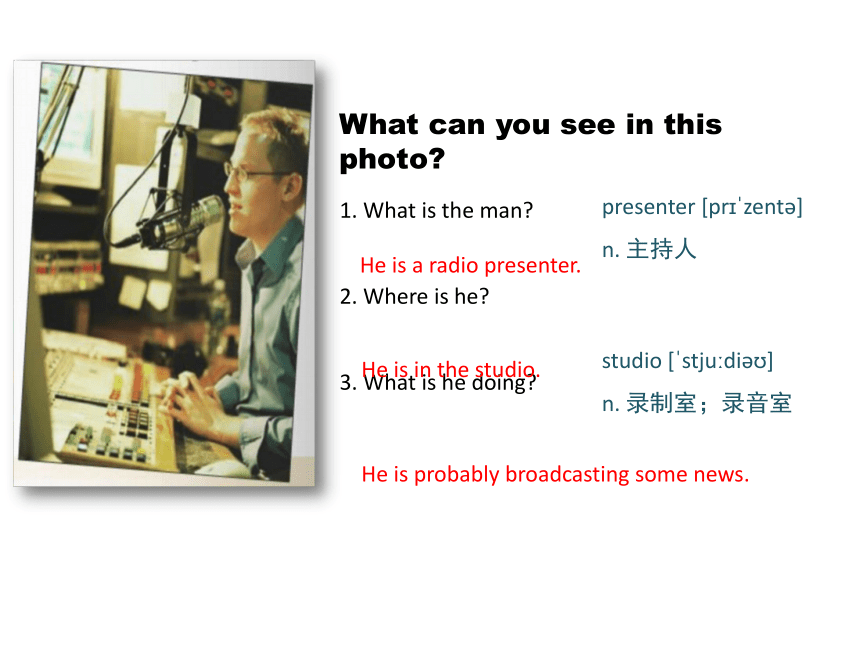
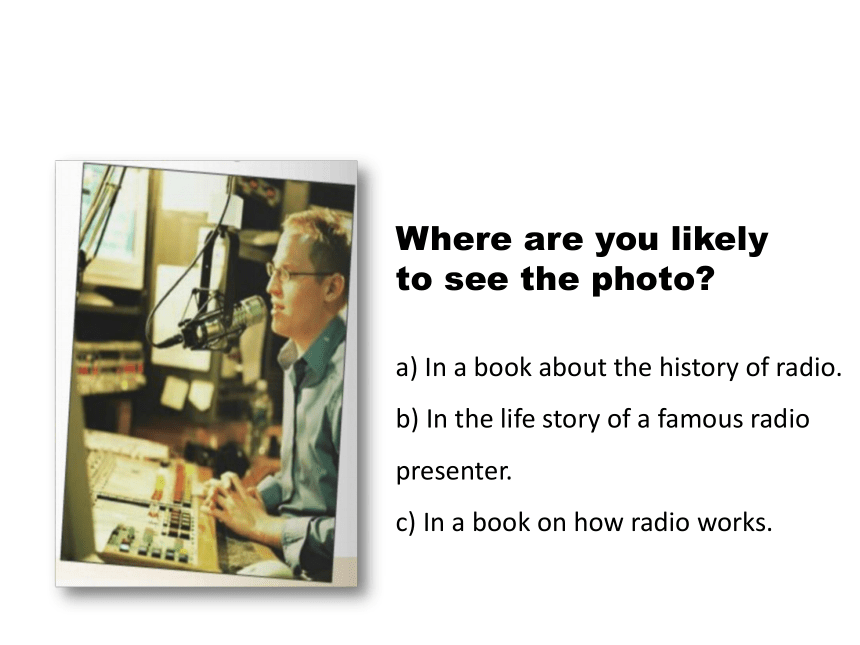
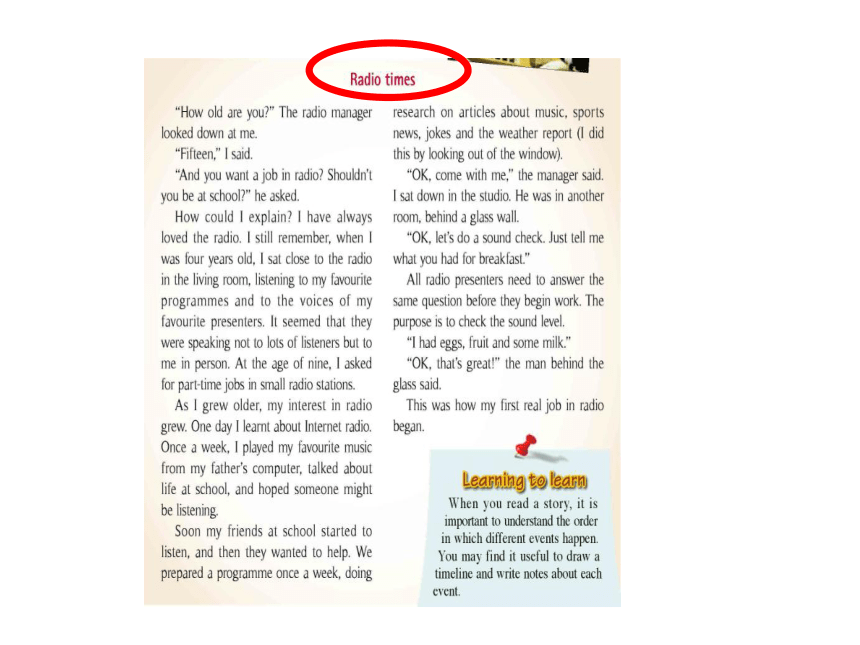
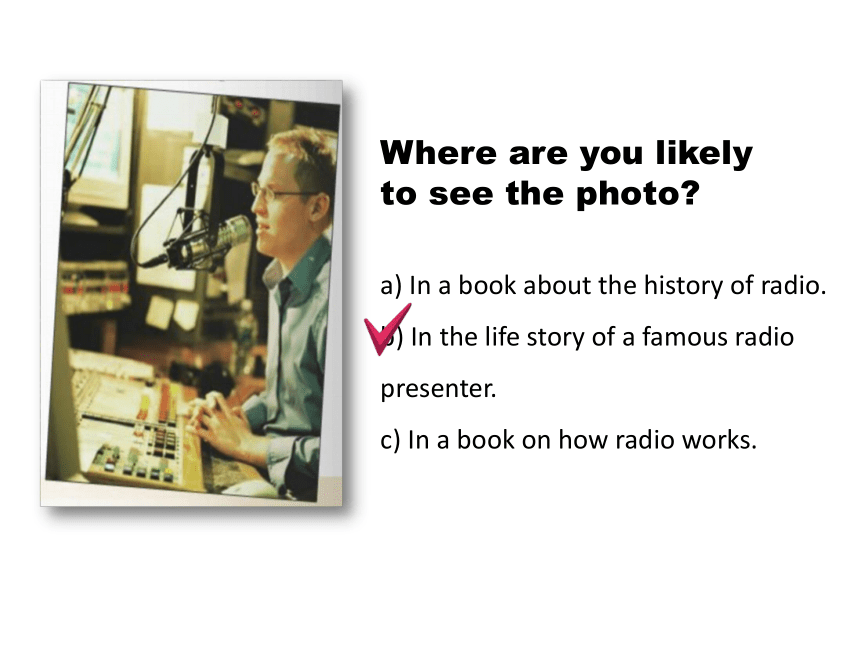
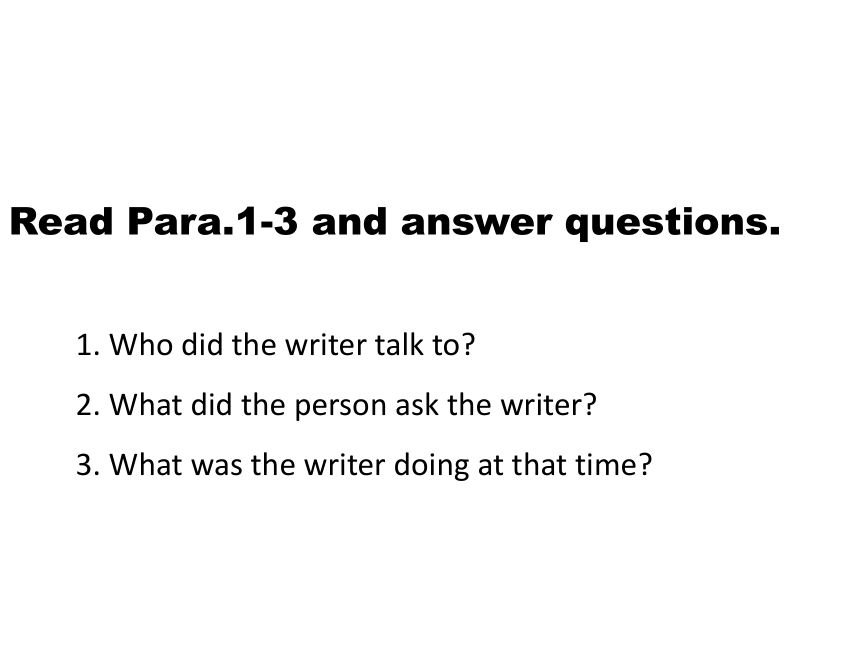
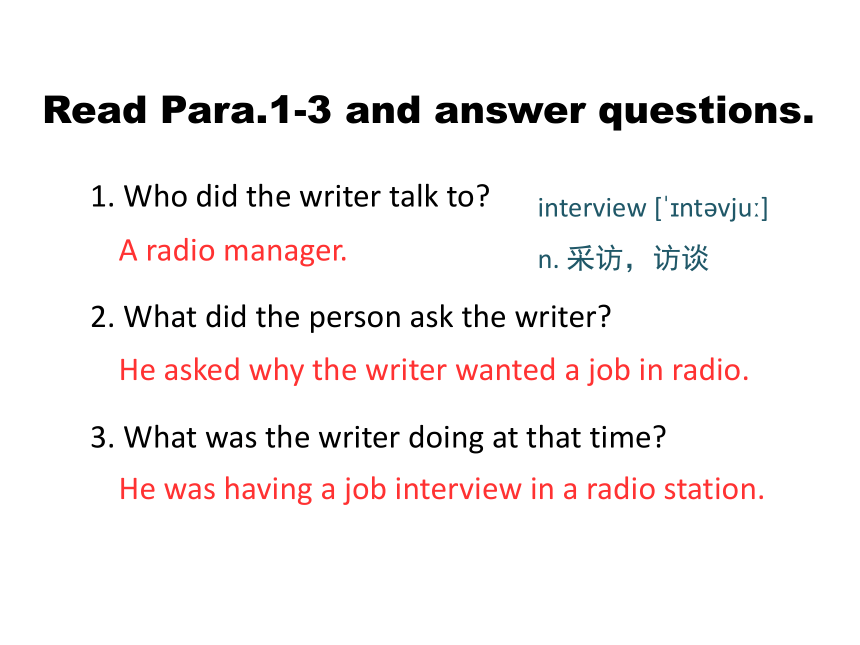
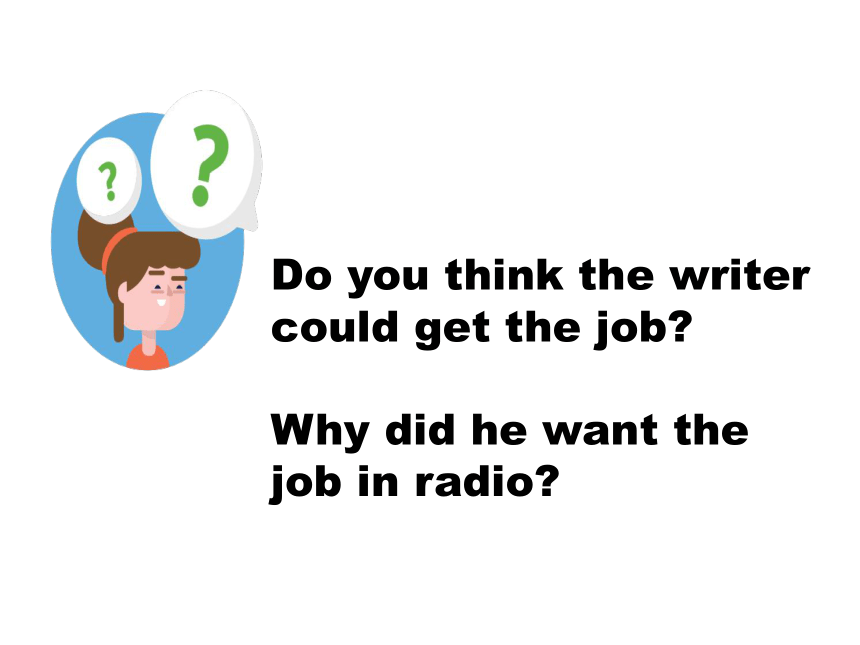
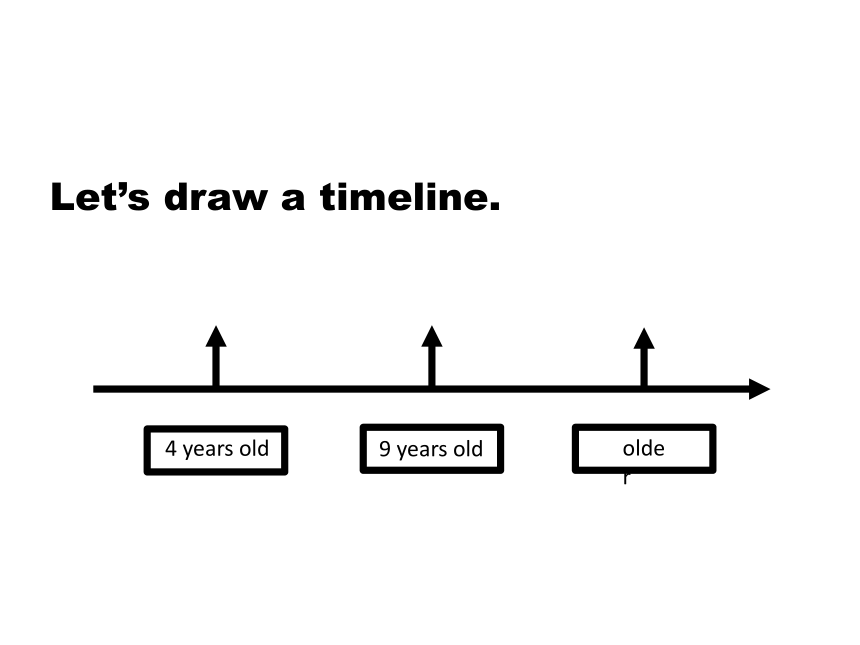
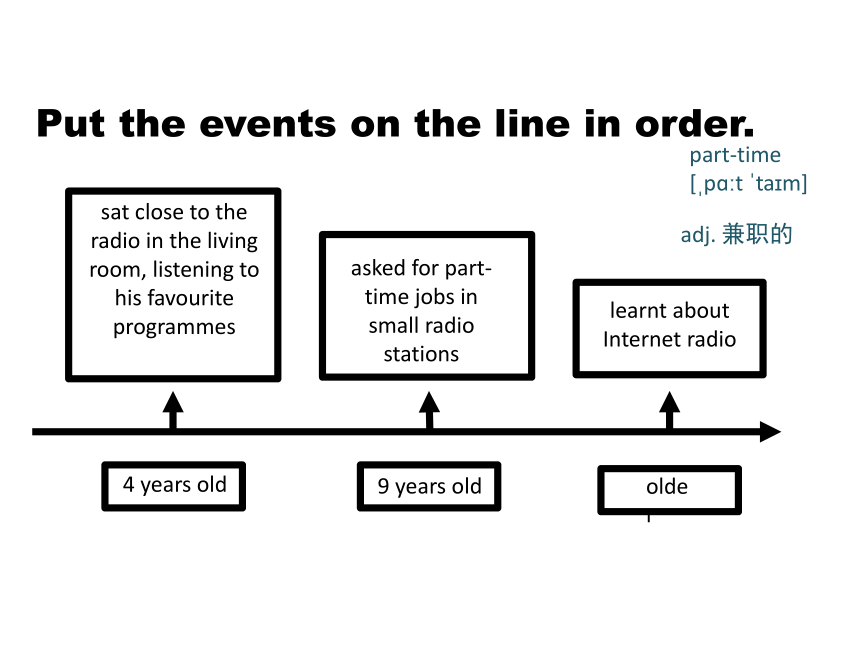
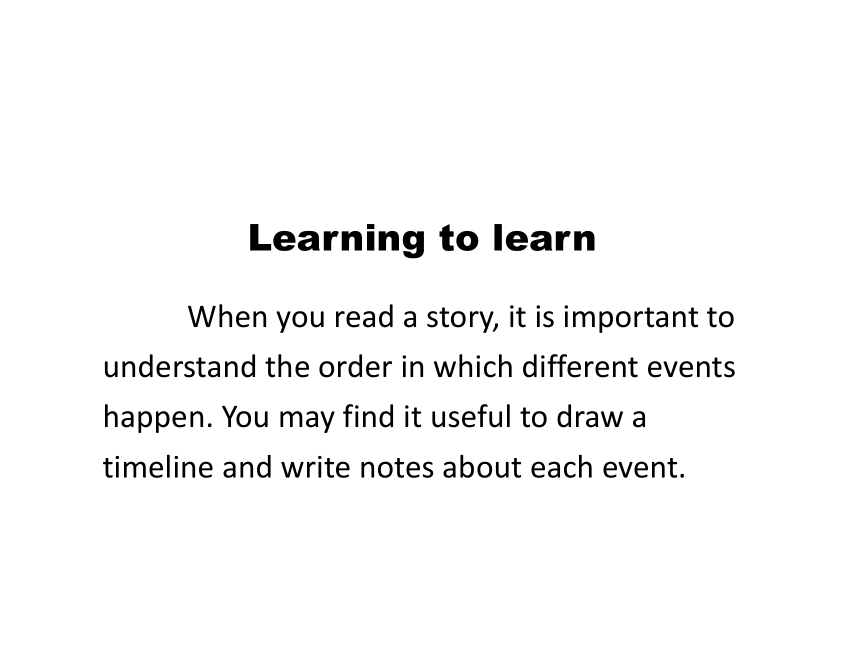
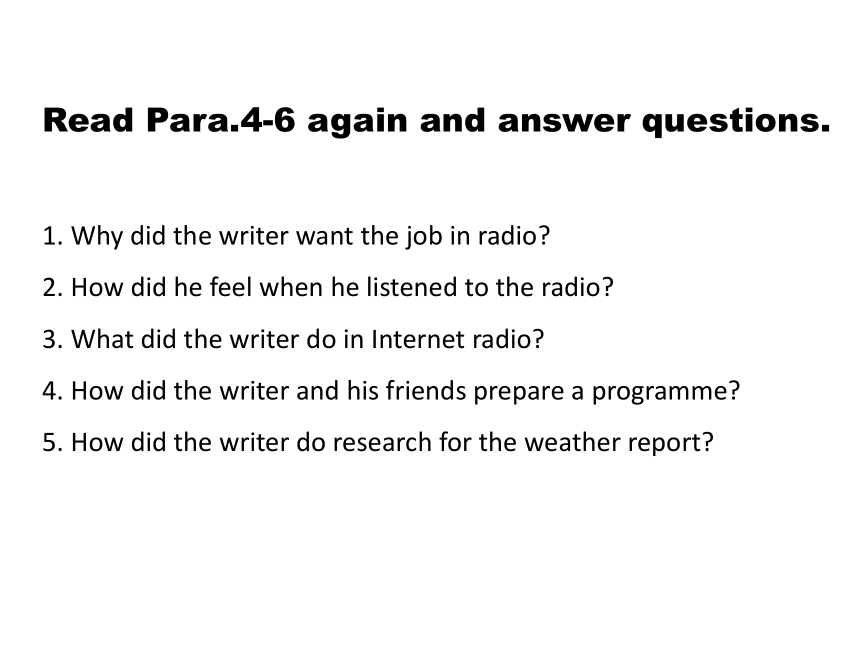
文档简介
(共32张PPT)
Module
10
Unit
2
It
seemed
that
they
were
speaking
to
me
in
person.
What
can
you
see
in
this
photo?
1.
What
is
the
man?
2.
Where
is
he?
3.
What
is
he
doing?
He
is
a
radio
presenter.
He
is
in
the
studio.
He
is
probably
broadcasting
some
news.
studio
[?stju?di??]
n.
录制室;录音室
presenter
[pr??zent?]
n.
主持人
Where
are
you
likely
to
see
the
photo?
a)
In
a
book
about
the
history
of
radio.
b)
In
the
life
story
of
a
famous
radio
presenter.
c)
In
a
book
on
how
radio
works.
Where
are
you
likely
to
see
the
photo?
a)
In
a
book
about
the
history
of
radio.
b)
In
the
life
story
of
a
famous
radio
presenter.
c)
In
a
book
on
how
radio
works.
Read
Para.1-3
and
answer
questions.
1.
Who
did
the
writer
talk
to?
2.
What
did
the
person
ask
the
writer?
3.
What
was
the
writer
doing
at
that
time?
Read
Para.1-3
and
answer
questions.
1.
Who
did
the
writer
talk
to?
2.
What
did
the
person
ask
the
writer?
3.
What
was
the
writer
doing
at
that
time?
interview
[??nt?vju?]
n.
采访,访谈
Do
you
think
the
writer
could
get
the
job?
Why
did
he
want
the
job
in
radio?
Let’s
draw
a
timeline.
4
years
old
9
years
old
older
Put
the
events
on
the
line
in
order.
4
years
old
sat
close
to
the
radio
in
the
living
room,
listening
to
his
favourite
programmes
asked
for
part-time
jobs
in
small
radio
stations
learnt
about
Internet
radio
part-time
[?pɑ?t
?ta?m]
adj.
兼职的
9
years
old
older
Learning
to
learn
When
you
read
a
story,
it
is
important
to
understand
the
order
in
which
different
events
happen.
You
may
find
it
useful
to
draw
a
timeline
and
write
notes
about
each
event.
Read
Para.4-6
again
and
answer
questions.
1.
Why
did
the
writer
want
the
job
in
radio?
2.
How
did
he
feel
when
he
listened
to
the
radio?
3.
What
did
the
writer
do
in
Internet
radio?
4.
How
did
the
writer
and
his
friends
prepare
a
programme?
5.
How
did
the
writer
do
research
for
the
weather
report?
1.
Why
did
the
writer
want
the
job
in
radio?
2.
How
did
he
feel
when
he
listened
to
the
radio?
seem
[si?m]
v.看来;似乎
listener
[?l?s?n?(r)]
n.听众;听者
in
person
[?n
?p??sn]
亲自;本人
3.
What
did
the
writer
do
in
Internet
radio?
4.
How
did
the
writer
and
his
friends
prepare
a
programme?
article
[?ɑ?t?kl]
n.
文章;报道
5.
How
did
the
writer
do
research
for
the
weather
report?
Read
Para.4-6
again
and
answer
questions.
1.
Why
did
the
writer
want
the
job
in
radio?
2.
How
did
he
feel
when
he
listened
to
the
radio?
3.
What
did
the
writer
do
in
Internet
radio?
4.
How
did
the
writer
and
his
friends
prepare
a
programme?
5.
How
did
the
writer
do
research
for
the
weather
report?
Read
Para.7-12
and
answer
questions.
1.
What
question
do
all
the
presenters
need
to
answer
before
they
begin
work?
2.
What’s
the
purpose
of
this
question?
Read
Para.7-12
and
answer
questions.
1.
What
question
do
all
the
presenters
need
to
answer
before
they
begin
work?
2.
What’s
the
purpose
of
this
question?
purpose
[?p??p?s]
n.
意图;目的
What’s
the
main
idea
of
each
part?
The
beginning
of
the
job
interview.
The
writer
explained
why
he
wanted
the
job
in
radio.
This
was
how
the
writer’s
first
real
job
in
radio
began.
What
helped
the
writer
get
his
first
real
job
in
radio?
If
you
were
the
manager,
would
you
hire
him?
Why
or
why
not?
What
helped
the
writer
get
his
first
real
job
in
radio?
1.
His
interest
in
radio
2.
His
work
experience
①
part-time
jobs
in
small
radio
stations
②
Internet
radio
Complete
the
passage
with
the
correct
form
of
the
words
and
expressions
in
the
box.
article
at
the
age
of
listener
purpose
seem
studio
Peter
(1)________
to
be
very
happy
with
his
new
job.
He
works
in
the
(2)________
of
a
local
radio
station.
He
is
lucky
that
(3)_____________
only
twenty
he
is
doing
something
he
loves
and
has
a
real
(4)________
.
Complete
the
passage
with
the
correct
form
of
the
words
and
expressions
in
the
box.
article
at
the
age
of
listener
purpose
seem
studio
Every
morning
when
he
starts
work,
he
does
a
sound
check
and
then
he
looks
for
interesting
newspaper
(5)________
to
talk
about
on
the
show.
Complete
the
passage
with
the
correct
form
of
the
words
and
expressions
in
the
box.
article
at
the
age
of
listener
purpose
seem
studio
The
(6)________
can
phone
in
to
talk
to
Peter
or
they
can
send
emails
to
ask
him
to
play
their
favourite
songs.
At
the
end
of
the
show,
he
closes
down
all
the
equipment
and
goes
home.
Look
at
the
sentences
from
the
passage.
Important
events
in
the
past
Background
information
“How
old
are
you?”
The
radio
manager
looked
down
at
me.
“Fifteen,”
I
said.
“And
you
want
a
job
in
radio?
Shouldn’t
you
be
at
school?”
he
asked.
I’ve
always
loved
the
radio.
I
still
remember,
when
I
was
four
years
old,
I
sat
close
to
the
radio
in
the
living
room,
listening
to
my
favourite
programmes
and
to
the
voices
of
my
favourite
presenters.
Find
more
sentences
in
the
passage.
Important
events
in
the
past
Background
information
Find
more
sentences
in
the
passage.
Important
events
in
the
past
Background
information
One
day
I
learnt
about
Internet
radio.
Once
a
week,
I
played
my
favourite
music
from
my
father’s
computer,
talked
about
life
at
school,
and
hoped
someone
might
be
listening.
Find
more
sentences
in
the
passage.
Important
events
in
the
past
Background
information
Soon
my
friends
at
school
started
to
listen,
and
then
they
wanted
to
help.
We
prepared
a
programme
once
a
week,
doing
research
by
reading
articles
about
music
and
sports
news.
We
also
did
research
for
jokes
and
the
weather
report
(I
did
this
by
looking
out
of
the
window).
Have
a
try!
Write
a
passage
to
describe
a
successful
experience
in
the
past.
Have
a
try!
What
did
you
achieve
in
the
past?
What
did
you
do
to
make
it?
How
did
you
feel
about
it?
Module
10
Unit
2
It
seemed
that
they
were
speaking
to
me
in
person.
What
can
you
see
in
this
photo?
1.
What
is
the
man?
2.
Where
is
he?
3.
What
is
he
doing?
He
is
a
radio
presenter.
He
is
in
the
studio.
He
is
probably
broadcasting
some
news.
studio
[?stju?di??]
n.
录制室;录音室
presenter
[pr??zent?]
n.
主持人
Where
are
you
likely
to
see
the
photo?
a)
In
a
book
about
the
history
of
radio.
b)
In
the
life
story
of
a
famous
radio
presenter.
c)
In
a
book
on
how
radio
works.
Where
are
you
likely
to
see
the
photo?
a)
In
a
book
about
the
history
of
radio.
b)
In
the
life
story
of
a
famous
radio
presenter.
c)
In
a
book
on
how
radio
works.
Read
Para.1-3
and
answer
questions.
1.
Who
did
the
writer
talk
to?
2.
What
did
the
person
ask
the
writer?
3.
What
was
the
writer
doing
at
that
time?
Read
Para.1-3
and
answer
questions.
1.
Who
did
the
writer
talk
to?
2.
What
did
the
person
ask
the
writer?
3.
What
was
the
writer
doing
at
that
time?
interview
[??nt?vju?]
n.
采访,访谈
Do
you
think
the
writer
could
get
the
job?
Why
did
he
want
the
job
in
radio?
Let’s
draw
a
timeline.
4
years
old
9
years
old
older
Put
the
events
on
the
line
in
order.
4
years
old
sat
close
to
the
radio
in
the
living
room,
listening
to
his
favourite
programmes
asked
for
part-time
jobs
in
small
radio
stations
learnt
about
Internet
radio
part-time
[?pɑ?t
?ta?m]
adj.
兼职的
9
years
old
older
Learning
to
learn
When
you
read
a
story,
it
is
important
to
understand
the
order
in
which
different
events
happen.
You
may
find
it
useful
to
draw
a
timeline
and
write
notes
about
each
event.
Read
Para.4-6
again
and
answer
questions.
1.
Why
did
the
writer
want
the
job
in
radio?
2.
How
did
he
feel
when
he
listened
to
the
radio?
3.
What
did
the
writer
do
in
Internet
radio?
4.
How
did
the
writer
and
his
friends
prepare
a
programme?
5.
How
did
the
writer
do
research
for
the
weather
report?
1.
Why
did
the
writer
want
the
job
in
radio?
2.
How
did
he
feel
when
he
listened
to
the
radio?
seem
[si?m]
v.看来;似乎
listener
[?l?s?n?(r)]
n.听众;听者
in
person
[?n
?p??sn]
亲自;本人
3.
What
did
the
writer
do
in
Internet
radio?
4.
How
did
the
writer
and
his
friends
prepare
a
programme?
article
[?ɑ?t?kl]
n.
文章;报道
5.
How
did
the
writer
do
research
for
the
weather
report?
Read
Para.4-6
again
and
answer
questions.
1.
Why
did
the
writer
want
the
job
in
radio?
2.
How
did
he
feel
when
he
listened
to
the
radio?
3.
What
did
the
writer
do
in
Internet
radio?
4.
How
did
the
writer
and
his
friends
prepare
a
programme?
5.
How
did
the
writer
do
research
for
the
weather
report?
Read
Para.7-12
and
answer
questions.
1.
What
question
do
all
the
presenters
need
to
answer
before
they
begin
work?
2.
What’s
the
purpose
of
this
question?
Read
Para.7-12
and
answer
questions.
1.
What
question
do
all
the
presenters
need
to
answer
before
they
begin
work?
2.
What’s
the
purpose
of
this
question?
purpose
[?p??p?s]
n.
意图;目的
What’s
the
main
idea
of
each
part?
The
beginning
of
the
job
interview.
The
writer
explained
why
he
wanted
the
job
in
radio.
This
was
how
the
writer’s
first
real
job
in
radio
began.
What
helped
the
writer
get
his
first
real
job
in
radio?
If
you
were
the
manager,
would
you
hire
him?
Why
or
why
not?
What
helped
the
writer
get
his
first
real
job
in
radio?
1.
His
interest
in
radio
2.
His
work
experience
①
part-time
jobs
in
small
radio
stations
②
Internet
radio
Complete
the
passage
with
the
correct
form
of
the
words
and
expressions
in
the
box.
article
at
the
age
of
listener
purpose
seem
studio
Peter
(1)________
to
be
very
happy
with
his
new
job.
He
works
in
the
(2)________
of
a
local
radio
station.
He
is
lucky
that
(3)_____________
only
twenty
he
is
doing
something
he
loves
and
has
a
real
(4)________
.
Complete
the
passage
with
the
correct
form
of
the
words
and
expressions
in
the
box.
article
at
the
age
of
listener
purpose
seem
studio
Every
morning
when
he
starts
work,
he
does
a
sound
check
and
then
he
looks
for
interesting
newspaper
(5)________
to
talk
about
on
the
show.
Complete
the
passage
with
the
correct
form
of
the
words
and
expressions
in
the
box.
article
at
the
age
of
listener
purpose
seem
studio
The
(6)________
can
phone
in
to
talk
to
Peter
or
they
can
send
emails
to
ask
him
to
play
their
favourite
songs.
At
the
end
of
the
show,
he
closes
down
all
the
equipment
and
goes
home.
Look
at
the
sentences
from
the
passage.
Important
events
in
the
past
Background
information
“How
old
are
you?”
The
radio
manager
looked
down
at
me.
“Fifteen,”
I
said.
“And
you
want
a
job
in
radio?
Shouldn’t
you
be
at
school?”
he
asked.
I’ve
always
loved
the
radio.
I
still
remember,
when
I
was
four
years
old,
I
sat
close
to
the
radio
in
the
living
room,
listening
to
my
favourite
programmes
and
to
the
voices
of
my
favourite
presenters.
Find
more
sentences
in
the
passage.
Important
events
in
the
past
Background
information
Find
more
sentences
in
the
passage.
Important
events
in
the
past
Background
information
One
day
I
learnt
about
Internet
radio.
Once
a
week,
I
played
my
favourite
music
from
my
father’s
computer,
talked
about
life
at
school,
and
hoped
someone
might
be
listening.
Find
more
sentences
in
the
passage.
Important
events
in
the
past
Background
information
Soon
my
friends
at
school
started
to
listen,
and
then
they
wanted
to
help.
We
prepared
a
programme
once
a
week,
doing
research
by
reading
articles
about
music
and
sports
news.
We
also
did
research
for
jokes
and
the
weather
report
(I
did
this
by
looking
out
of
the
window).
Have
a
try!
Write
a
passage
to
describe
a
successful
experience
in
the
past.
Have
a
try!
What
did
you
achieve
in
the
past?
What
did
you
do
to
make
it?
How
did
you
feel
about
it?
同课章节目录
- Module 1 Feelings and impressions
- Unit 1 It smells delicious.
- Unit 2 I feel nervous when I speak Chinese .
- Unit 3 Language in use
- Module 2 Experiences
- Unit 1 I've also entered lots of speaking competi
- Unit 2 They have seen the Pyramids.
- Unit 3 Language in use
- Module 3 Journey to space
- Unit 1 Has it arrived yet?
- Unit 2 We have not found life on any other planet
- Unit 3 Language in use
- Module 4 Seeing the docto
- Unit 1 I haven't done much exercise since I got m
- Unit 2 We have played football for a year now
- Unit 3 Language in use
- Module 5 Cartoons
- Unit 1 It's time to watch a cartoon.
- Unit 2 Tintin has been popular for over eighty yea
- Unit 3 Language in use
- Revision module A
- Module 6 Hobbies
- Unit 1 Do you collect anything ?
- Unit 2 Hobbies can make you grow as a person.
- Unit 3 Language in use
- Module 7 Summer in Los Angeles
- Unit 1 Please write to me and send me some photos
- Unit 2 Fill out a form and come to learn English
- Unit 3 Language in use
- Module 8 Time off
- Unit 1 I can hardly believe we are in the city ce
- Unit 2 We thought somebody was moving about
- Unit 3 Language in use
- Module 9 Friendship
- Unit 1 Could I ask if you've mentioned this to he
- Unit 2 I believe that the world is what you think
- Unit 3 Language in use
- Module 10 On the radio
- Unit 1 I hope that you can join us one day
- Unit 2 It seemed that they were speaking to me in
- Unit 3 Language in use
- Revision module B
